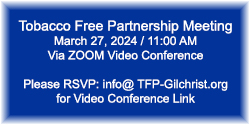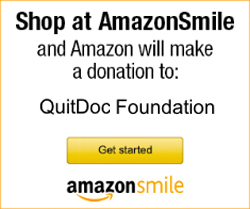News and Events
Breaking the Menthol Grip: Educating Communities on the Hidden Dangers of Tobacco
March 13, 2025
This quarter, the Tobacco Free Partnership of Gilchrist County hosted a table at the UpLift Tri County event held at the local Camp Anderson Park in Old Town, Florida. The event brought together an eclectic mix of vendors, community resource organizations, local law enforcement, and leaders from various local ministries. The main goal was to promote awareness about available resources for rural counties and the opportunities they provide for low-income individuals, as well as for historically underserved populations. The event was a resounding success, featuring prominent guest speakers who emphasized the need for positive change and the improvement of our community’s overall well-being.

The Tobacco Free Partnership seized this opportunity to inform attendees about the dangers of tobacco products—not only for the smoker but also for those around them and the environment as a whole. The focus of the partnership during the event was on the dangers of menthol tobacco products and the misleading advertising that surrounds them. Menthol, which has been added to tobacco products since the 1920s, was originally marketed as a way to reduce the harshness of smoking, making it easier for new users to begin smoking. However, what consumers were not told is that menthol's soothing properties actually make it easier for people to become addicted to smoking in the long term.
Since its introduction, menthol tobacco products have been heavily marketed, particularly towards certain minority groups. In the case of the African American community, menthol cigarettes have been specifically targeted through advertising campaigns that use themes of empowerment, lifestyle, and cultural relevance. This has resulted in a disproportionate number of African Americans using mentholated products, contributing to an alarming public health crisis. In fact, studies have shown that nearly 85% of African American smokers choose menthol cigarettes, compared to just 30% of smokers in the general population.
This targeted marketing is not just a coincidence. The tobacco industry has long recognized the vulnerability of these communities and has used this knowledge to build a steady consumer base. Through strategic advertising in Black neighborhoods, sponsorship of culturally relevant events, and the use of celebrities and influencers, tobacco companies have cultivated a brand identity within African American culture. This predatory approach has led to greater rates of smoking, higher levels of addiction, and significant health disparities within these communities.
The health impact of menthol smoking is profound. African Americans who smoke mentholated products are at a higher risk for chronic diseases such as heart disease, lung cancer, and respiratory issues, along with a host of other serious conditions. Furthermore, studies have also indicated that menthol smokers are more likely to become addicted at younger ages and have a harder time quitting compared to non-menthol smokers. This creates a cycle of addiction and health inequity that disproportionately affects Black communities.
Recognizing the urgency of this issue, the Tobacco Free Partnership utilized this event to call upon community leaders—especially those from local ministries—to take the information provided and share it with their congregations. Religious leaders are powerful advocates in their communities, and by educating their churches about the dangers of menthol tobacco, they can help reduce the spread of these addictive products. This outreach is particularly important because churches are often seen as trusted sources of guidance and support, making them an ideal avenue for disseminating critical health information.
The partnership’s goal is to encourage individuals to make informed decisions about their health and take action to quit or avoid using tobacco products altogether. By empowering local leaders to spread this knowledge, the Tobacco Free Partnership hopes to foster a community-wide effort to combat the harmful impact of tobacco. Educating individuals about the dangers of menthol products is a powerful weapon in the fight against Big Tobacco, whose marketing strategies continue to target vulnerable communities in an effort to maintain their profits.
At the heart of this initiative is the idea that education is the most effective tool we have to take control of our health and challenge the tobacco industry’s exploitative practices. If we can prevent new generations from starting to smoke, and help those who are already addicted quit, we can diminish the power of these corporations. By doing so, we take away the dollars that line their pockets and, in turn, help improve the overall health and well-being of our communities.
The success of the UpLift Tri County event was just the beginning. As we continue to engage local leaders and share this message, we hope to see a growing movement in Gilchrist County and beyond—one that challenges the tobacco industry’s hold on our communities and leads to a healthier, tobacco-free future for all.




